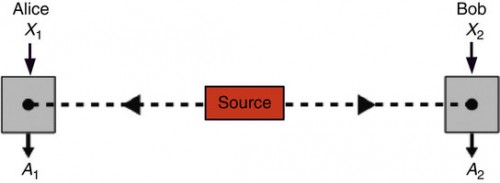Welcome to Purple Pawn, covering games played around the world by billions of people every day.
Why the Physicist in Your Game Group Always Wins
15 Jul
Posted by David Miller as Card Games, CCGs, Classic Board Games, Electronic Games, Gamification, Miniatures, Modern Board Games, RPGs, War Games

Researchers at the Universities of Bristol and Geneva have discovered a link between quantum mechanics and game theory. According to a paper published by Nicolas Brunner and Noah Linden in Nature Communication, players’ use of entangled quantum particles in Bayesian games “will lead to novel joint strategies, impossible to achieve classically.”
According to classical physics, location limits the performance of players. Brunner and Linder, however, show that the non-local features of quantum mechanics—that is, the ability of entangled particles to communicate when separated—are also reflected in games. According to Dr. Brunner:
Such an advantage could, for instance, be useful in auctions which are well described by the type of games that we considered. Therefore, our work not only opens a bridge between two remote scientific communities, but also opens novel possible applications for quantum technologies.
[via ScienceDaily]
No Comments
Sorry, the comment form is closed at this time.
Trending
- Home
- The 20 Most Valuable Vintage Board Games
- Are Board Games Dangerous?
- The Chicken Roundabout Game
- Watch This Game!, the Board Game Review Board Game
- Ben 10 Games
- Karma Chakra, a Buddhist Board Game
- Oh the Irony—Illuminati Card Game Continues to Inspire Conspiracy Theorists
- Second Look—Classic Battleship Movie Edition
- Sid the Science Kid
Archives
Most Popular Articles
- The 20 Most Valuable Vintage Board Games
- Sequence Game, and Variants
- USPS Adds Board Game Flat Rate Box
- Baila, the Estonian Drinking Card Game
- The 13 Most Popular Dice Games
- The Truth About Dominoes On Sunday in Alabama
- Oh the Irony—Illuminati Card Game Continues to Inspire Conspiracy Theorists
- Are Board Games Dangerous?
- The Convoluted Story of Iron Wind Metals, Ral Partha, and Battletech Miniatures
- Guess Who? The Naked Version
Recent Posts
- Toy Fair 2019—Breaking Games
- Talisman Kingdom Hearts Edition
- Toy Fair 2019—Winning Moves
- Toy Fair 2019—Games Workshop
- Toy Fair 2019—Star Wars Lightsaber Academy
- Toy Fair 2019—Stranger Things Games
- Toy Fair 2019—HABA
- Licensing Roundup
- Game Bandit
- 2018 A Difficult Year For Hasbro But Not For D&D Or MtG
Recent Comments
- on Toy Fair 2019—Winning Moves
- on Game Bandit
- on Second Look—Dungeons & Dragons Waterdeep Dragon Heist
- on Crowdfunding Highlights
- on Beyblade SlingShock
- on Game Bandit
- on Game Bandit
- on Watch This Game!, the Board Game Review Board Game
- on Second Look—Vampire: The Masquerade 5th Edition
- on Palladium Books Loses Robotech IP License, Cancels Five-Year-Overdue Robotech RPG Tactics Kickstarter




